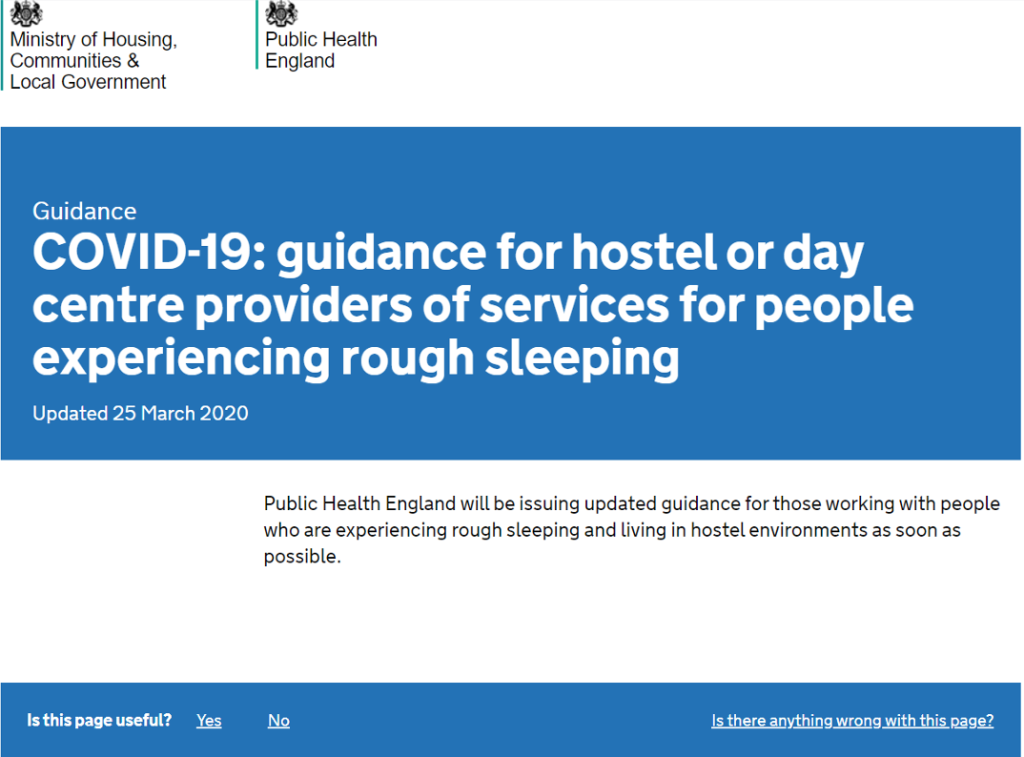Ethnographic storytelling uses literary techniques ‘to construct from fieldnotes a narrative that will interest an outside audience’ (Emerson, 2011: 202). The resulting narratives have been praised for creating a ‘more public, engaging, affective, and panoramic sociology’ (Watson, 2016: 431). As such, this blog post tells the story of the first potential COVID-19 case at a 93-bed homeless hostel.
Today the atmosphere had changed. One-word responses from staff, ever-increasing posters urging you to “WASH YOUR HANDS!”, and a constant disinfecting of door handles. The residents were aware that something was up, taking a pump of hand sanitiser as they left the building, propping doors open with their feet, and using sleeves as makeshift facemasks.
But despite the tension in the air, there were tasks that needed to be done, and today Lisa was carrying out room checks. With the fourth floor checked off, she made her way down the off-lemon corridor and knocked on room 37, “Hello! Staff!”, she called twice before letting herself in. After scanning the room – clothes piled on the floor, cigarette butts on the bedside table, a few flies – she identified no major concerns, so gave it a ‘green’.
As Lisa scribbled down this result, a door clunked open behind her. She turned to see a resident hovering in the doorway of room 39, mouth buried in the crook of his elbow, “I’ve just been told to self-isolate”.
The words that everybody had feared.
“Stay in your room!” insisted Lisa as she ran towards the stairwell. Gloves discarded and hands washed several times over, Lisa knocked on the managers’ door, hurriedly recounting the last few moments.
Charlie sighed, “here we go”. His shoulders deflated. Armed with gloves and a mask, he went to speak to the man himself.
His short trip to room 39 filled him with disbelief. As he returned to the safety of his office, Charlie began mulling the conversation over; how could they advise him to go to the GP for testing? That goes completely against government guidance.
This couldn’t be right, there must be a solution to this testing conundrum. Though after the sixth phone call and at least 40 minutes of hold music, it dawned on Charlie that there was no solution: 111 didn’t answer, 101 said that it wasn’t their issue, and 999 refused to come out for testing. He took a moment to silently process this, before facing his staff.
Handover was often an orderly, mundane affair, a summary of the day’s events. But not today. Today, the small office resembled a stock exchange, a sporadic voicing of questions and concerns:
“But he’s on a methadone script. It’s daily pick up, how can he isolate?”
“And what about people with alcohol dependency? If they stop drinking, they could die!”
“Lots of our guys have health conditions, they could be really vulnerable, especially here.”
“I’m vulnerable too.”
“My wife has COPD. I don’t want to take it home to her.”
“If it gets in then we’re all screwed.”
“So, if one person isolates, would they all have to?”
“They won’t all go for that, too many are focused on their next hit.”
“They can’t stay in their rooms anyway; they share a kitchen!”
“There are rumours going around that people have it, some of the guys are really worried.”
Charlie scribbled down these concerns then addressed the room, “all we can do for now is log any residents who present with symptoms on the system, I’ll pass this on to Public Health England and hopefully they will be in touch, we should be a priority after all.”
Elizabeth interjected, “room 15 complained about feeling hot and sweaty earlier, but he gets like that after using anyway, so I don’t really know what to do”.
Charlie, “can you get him to call 111?”
Elizabeth, “I tried, but he hung up, didn’t want to wait in the queue.”
Adrian chipped in, “he’s got to self-isolate then, he can’t be walking around like that!”
Elizabeth, “but what am I meant to do? I can’t force him to stay in his room.”
Returning to his office, Charlie confided in Lisa, “the government haven’t thought about our residents; the general advice is meant for a nuclear family not a 90-bed hostel! It just won’t work for them”. He logged onto his computer and was greeted by an overflow of covid-related emails.
There was a loud knock and Elizabeth poked her head around the door, “room 39’s gone to his GP for a test”.
On 23rd March, just three days later, England went into a national lockdown. Forced to continue my ‘fieldwork’ at home, I turned my attention to secondary sources. Keen to read the government’s advice on managing COVID-19 within a hostel setting, to see whether it would address the staff’s many concerns, I visited the government’s website on a near daily basis. What I was greeted with, rather than solutions to script collection or isolating in a congregate setting, was a simple message promising to provide guidance ‘as soon as possible’. This message, shown below, was in place until 5th August 2020, when the government finally published their advice.

Bibliography
Emerson, R. Fretz, R. and Shaw, L. 2011. Writing Ethnographic Fieldnotes. 2nd ed. Chicago: University of Chicago Press.
Watson, A. 2016. Directions for Public Sociology: Novel Writing as a Creative Approach. Cultural Sociology 10(4), pp. 431-447.